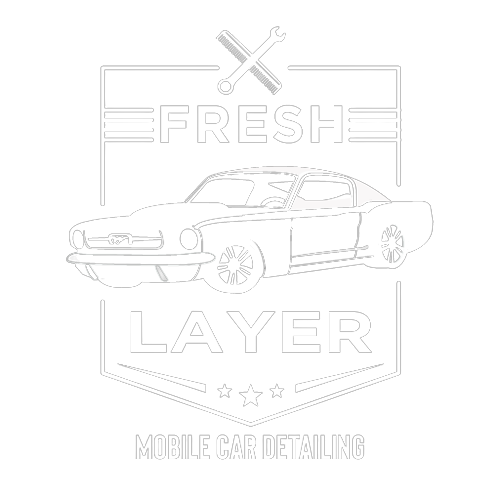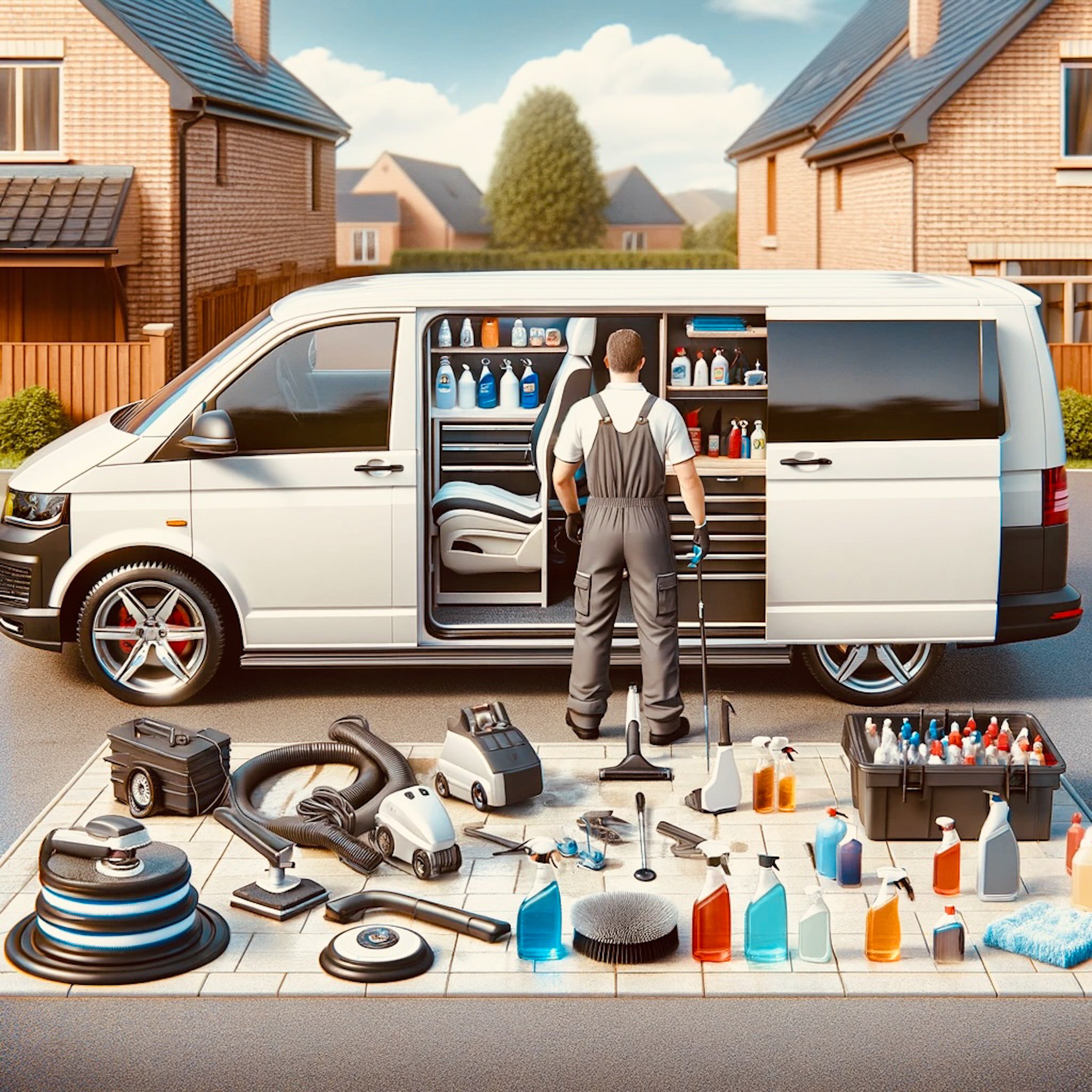SKILLS AND KNOWLEDGE IN DETAILING BUSINESS
In the highly specialized field of auto detailing, the proficiency of a technician is often the linchpin of success. Mastery over a comprehensive set of skills and a deep understanding of various detailing techniques not only set professionals apart from their competition but also significantly enhance the quality of their services.
Whether dealing with routine maintenance or complex restorative projects, a detailer’s expertise can greatly impact the appearance and longevity of a vehicle.Additionally, we'll discuss the importance of customer service and business acumen, which are equally pivotal in running a successful detailing business.
Basic Skills Required for Auto Detailing
Mastering the fundamentals of auto detailing is crucial for anyone entering the industry or looking to enhance their service quality. Here, we focus on the basic yet essential skills that form the foundation of professional detailing.
Technical Skills
The technical aspect of detailing involves a range of hands-on skills that are essential for the meticulous care of vehicles:
Washing: Mastery of proper washing techniques ensures that the vehicle is cleaned without causing damage to the paint or finish. This includes choosing the right soaps and tools, and employing techniques like the two-bucket wash method to minimize the risk of scratches.
Waxing: Application of wax not only protects the paint but also gives the vehicle a new-like shine. Detailers must know how to apply wax evenly and buff it out properly to prevent buildup and ensure maximum longevity.
Interior Cleaning: This involves vacuuming, shampooing upholstery, cleaning vents, and more. Knowledge of the various materials found inside vehicles, from leather to synthetic fabrics, and the appropriate cleaning agents for each, is critical.
Attention to Detail
In auto detailing, the difference between good and great often lies in the details:
Precision and thoroughness are what set apart high-quality detailing jobs. Attention to detail involves noticing and addressing even the smallest imperfections, whether it's a tiny scratch on the paint or a hidden stain on the upholstery.
A detail-oriented approach ensures that every aspect of the vehicle is inspected and cared for, which enhances overall customer satisfaction and helps build a reputation for quality.
Physical Stamina and Dexterity
Detailing is physically demanding, requiring both stamina and dexterity:
Physical Stamina: Detailers often work for hours at a stretch, sometimes in challenging conditions like extreme heat or cold. Physical fitness helps in maintaining high energy levels and endurance throughout long detailing sessions.
Dexterity: Fine motor skills are essential when working with small tools and applying products precisely. The ability to manipulate tools effectively in tight spaces or for intricate tasks like paint correction is crucial for achieving the desired results.
Understanding and developing these basic skills are the first steps toward becoming proficient in auto detailing. They ensure that detailers can handle the physical demands of the job while delivering services that meet the high standards expected by clients.
Advanced Detailing Techniques
As auto detailing professionals progress in their careers, mastering advanced techniques becomes essential to differentiate their services and cater to more discerning clientele. Two of the most valuable skills in high-end auto detailing are paint correction and ceramic coating application, both of which require precision and expertise.
Paint Correction
Paint correction is a highly skilled process aimed at removing imperfections in a vehicle's paintwork, such as swirl marks, scratches, oxidation, and etching caused by environmental exposure:
Understanding Paint Imperfections: A skilled detailer must be able to identify different types of paint damage and understand their causes. This knowledge is crucial for choosing the appropriate correction method.
Techniques and Tools: Paint correction typically involves the use of machine polishers, various grades of polishing compounds, and finishing products. Detailers must be proficient with orbital and rotary polishers, understanding how to select and manipulate pads and compounds to achieve the best results without damaging the paint.
Assessing Results: The ability to critically assess the paintwork throughout the correction process is essential. This includes checking the work under different lighting conditions to ensure that all imperfections have been effectively treated.
Ceramic Coating Application
Ceramic coatings provide a high level of protection to the vehicle’s exterior, offering resistance against chemical etching, UV damage, and adding a hydrophobic (water-repellant) layer that makes the vehicle easier to clean:
Surface Preparation: Before applying a ceramic coating, the surface must be perfectly clean and free of any contaminants. This often involves thorough washing, clay barring, and potentially paint correction.
Application Skills: Applying ceramic coating requires a steady hand and meticulous technique. The coating must be applied evenly and at the correct thickness, using specific applicators and following precise manufacturer instructions for curing times and environmental conditions.
Post-Application Care: Knowledge of post-application care is crucial for ensuring the longevity of the coating. Detailers must advise customers on proper maintenance routines, which typically include specific washing techniques and avoiding certain chemicals.
Mastering these advanced techniques not only enhances a detailer’s skill set but also increases the value of their services, allowing them to cater to customers who demand the highest standards for their vehicles.
Knowledge Areas Important for Detailers
To excel in the auto detailing industry, professionals must continually expand their knowledge across several key areas. This continuous learning not only improves service quality but also ensures safety and efficiency. Here are essential knowledge areas that every detailer should master:
Chemical Products Knowledge
Understanding the chemicals used in detailing is crucial for both the effectiveness of cleaning and the safety of the vehicle's surfaces:
Types of Chemicals: Detailers must be familiar with a variety of cleaning agents, polishes, waxes, and protectants, each suited for different parts of the vehicle, such as paint, glass, leather, and plastic.
Safe Application: Knowledge of how to safely apply these chemicals to avoid damage to the vehicle and harm to the environment is critical. This includes understanding dilution ratios, proper handling, and storage practices.
Health and Safety: The proper use of personal protective equipment (PPE) and adherence to health guidelines are essential when handling potentially hazardous chemicals.
Tools and Equipment
Staying up-to-date with the latest tools and technologies in the detailing industry can significantly enhance the efficiency and quality of work:
Detailing Tools: From high-powered washers and steam cleaners to precision polishers and extractors, knowing how to operate and maintain each tool is vital.
Technological Advances: Embracing new technologies, such as advanced vacuum systems or eco-friendly steam cleaning solutions, can help detailers stay competitive and meet the increasing demands of eco-conscious consumers.
Maintenance: Regular maintenance and correct calibration of detailing equipment ensure consistent performance and prevent breakdowns, which can cause delays and additional costs.
Vehicle Types and Materials
Different vehicles and materials require specific approaches to detailing to ensure optimal results and prevent damage:
Material Specifics: A deep understanding of materials such as leather, vinyl, fabric, and synthetics is necessary to choose the correct cleaning agents and techniques. For example, leather requires conditioners and soft cloths to prevent drying and cracking, while vinyl can be cleaned with more robust solutions.
Custom Detailing: Tailoring detailing methods to different types of vehicles—from luxury cars to SUVs and motorcycles—enhances customer satisfaction and can cater to a broader client base.
Innovative Practices: Keeping abreast of industry trends and innovative practices, like ceramic coatings for different surfaces, can provide detailers with a competitive edge.
For detailers, investing time in learning about chemicals, tools, and the specific needs of various vehicle types not only increases their expertise but also builds trust with clients, affirming their professionalism and commitment to quality service.
Continuous Learning and Certification
In the fast-evolving auto detailing industry, continuous professional development and certification are essential for staying competitive and delivering top-notch service. This section highlights the importance of ongoing training and recommends resources to support detailers in their professional growth.
Professional Development
Continued learning and skill enhancement are crucial for any detailer committed to excellence:
Importance of Training: Regular training helps detailers keep up with the latest techniques, products, and technologies in the industry. It ensures that they are equipped to handle new challenges and meet higher standards of service quality.
Certification: Obtaining professional certifications not only validates a detailer’s skills but also boosts credibility with clients. Certifications can serve as a marketing tool, distinguishing a detailer from competitors.
Adapting to Industry Changes: The detailing industry frequently sees introductions of new materials used in vehicle manufacturing, eco-friendly products, and regulatory changes regarding chemical use. Ongoing education helps detailers adapt to these changes effectively.
Resources for Learning
There are numerous resources available for detailers seeking to enhance their knowledge and skills:
Courses and Workshops: Many industry associations and product suppliers offer courses ranging from beginner to advanced levels. Workshops that focus on specific skills like paint correction, ceramic coating application, or advanced interior detailing are particularly beneficial.
Online Learning Platforms: With the rise of digital education, online courses and webinars have become a convenient way for detailers to learn at their own pace. Platforms like Udemy, Coursera, or industry-specific training websites offer a range of tutorials that can be accessed remotely.
Certification Programs: Reputable organizations within the detailing industry offer certification programs. These programs often include hands-on training sessions and require passing a test to earn the certification.
Trade Shows and Conferences: Attending industry trade shows and conferences not only provides learning opportunities through seminars and live demonstrations but also helps detailers network with peers and learn from their experiences.
Encouraging detailers to invest in their professional development through continuous learning and certification not only enhances their technical competencies but also helps them build a reputation as knowledgeable and reliable professionals. This commitment to learning can lead to greater career success and customer satisfaction.
Conclusion
The journey to becoming a proficient auto detailer involves much more than mastering the initial technical skills—it requires an ongoing commitment to learning and adaptation. As we have explored throughout this article, developing a deep understanding of the various techniques, tools, and materials involved in auto detailing is crucial for any professional aiming to deliver exceptional service.
Recap of the Importance of Developing and Enhancing Detailing Skills and Knowledge
Auto detailing is a dynamic field that blends art and science, requiring detailers to continuously refine their craft. From understanding the basics of vehicle cleaning to mastering advanced protective treatments like ceramic coatings, each skill enhances a detailer’s ability to protect and restore vehicles effectively. Moreover, knowledge of the latest chemicals and tools ensures that detailers can offer the safest, most efficient services to their clients.
In conclusion, whether you are starting your journey in auto detailing or looking to elevate your existing skills, remember that the key to success lies in perpetual growth and learning. Embrace the numerous resources available, and commit to a path of ongoing professional development to achieve and sustain excellence in the detailing world.




